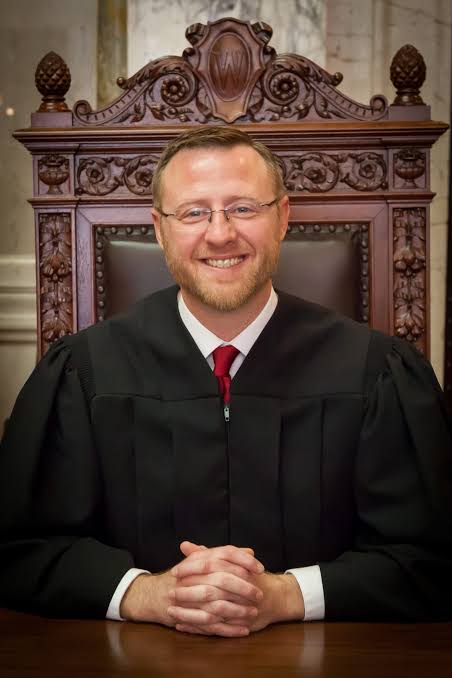Wisconsin Justice Makes Right Call in Recusing From Employee Rights Case
By Kit Beyer, FTC law clerk
 Wisconsin Supreme Court Justice Brian Hagedorn (at right), appointed by former Gov. Scott Walker, announced on Jan. 30 that he’s recusing himself from a high-profile case involving state employee bargaining rights.
Wisconsin Supreme Court Justice Brian Hagedorn (at right), appointed by former Gov. Scott Walker, announced on Jan. 30 that he’s recusing himself from a high-profile case involving state employee bargaining rights.
Before he began his judicial service, Hagedorn served as chief counsel to Walker, during which time he participated in the drafting and legal defense of the law at issue in the case, known as Act 10. Thus, while expressing his opinion that recusal “should be rare,” his order concludes that he is legally required to step aside.
Indeed, Wisconsin statute §757.19 lists seven circumstances that would compel a judge’s recusal. Several could potentially be relevant here.
First, §757.19(2)(c) mandates recusal if “a judge previously acted as counsel to any party in the same action.” Though Hagedorn did not act as counsel in this precise proceeding, his recusal order notes that he has acted as counsel “in a case raising nearly identical claims.” Participating as a judge in this case could, therefore, give rise to the same fairness concerns that underlie §757.19(2)(c).
Second, §757.19(2)(d) calls for recusal “a judge prepared as counsel any legal instrument . . . whose validity . . . is at issue,” which would seem to apply to Hagedorn’s drafting of Act 10.
And lastly, §757.19(2)(g) functions as a catch-all provision: a judge must recuse if he “determines that, for any reason, he or she cannot, or it appears he or she cannot, act in an impartial manner.” Justice Hagedorn may simply have decided that this general, subjective standard obtains here.
Whatever the case, his decision is the correct one. It also illustrates the benefit of requiring judges to “file in writing the reasons” for their disqualification, as Wisconsin’s §757.19(5) does.
We have previously pointed out that rules like these enhance the transparency of the judicial process, and that remains true today. Recusal explanations provide litigants and the public with reassurance that judges are deciding cases fairly and are committed to upholding the ethical values that accompany their public office.
“Members of the judiciary take a solemn oath to be independent and impartial,” Hagedorn stated in his order. “Our duty is to call it straight in every case, with neither partiality nor prejudice toward anyone.”
With that, we could hardly agree more.